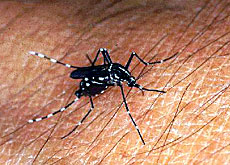
Asian tiger mosquitoes descend on Zurich

Asian tiger mosquitoes, which can carry harmful diseases like the Zika virus, have reached the Swiss city of Zurich. Insects, larvae and eggs were found in the Wollishofen area.
Tiger mosquito eggs had already been discovered three years ago near Zurich station in buses coming from abroad. The specimens found in the Wollishofen district survived the winter, the city authorities said on Tuesday.
Control measures have been put in place. The residents of the neighbourhood were invited to an information session. There is currently no reason to be concerned about the presence of this insect, the authorities said.
Tiger mosquitoes can potentially transmit diseases such as dengue fever or Chikungunya.
The Zurich city authorities are asking for residents’ help in the fight against this insect. Anyone who spots a tiger mosquito is encouraged to either capture or photograph it for submission to the Environmental and Health Protection Department.
In Switzerland, tiger mosquitoes have already been spotted in Graubünden in the east, Ticino in the south and Basel in the north. In Europe, they have had a strong presence in Italy since the early 1990s. They have also been found in Germany, France, Belgium and the Netherlands.
The tiger mosquito, which originated in Southeast Asia, has a flight range of less than 200 metres and experts believe the worldwide transport of used tyres, probably from China, is to blame for its spread.

More
Ticino sounds the alarm over mosquito menace

In compliance with the JTI standards
More: SWI swissinfo.ch certified by the Journalism Trust Initiative




























You can find an overview of ongoing debates with our journalists here . Please join us!
If you want to start a conversation about a topic raised in this article or want to report factual errors, email us at english@swissinfo.ch.